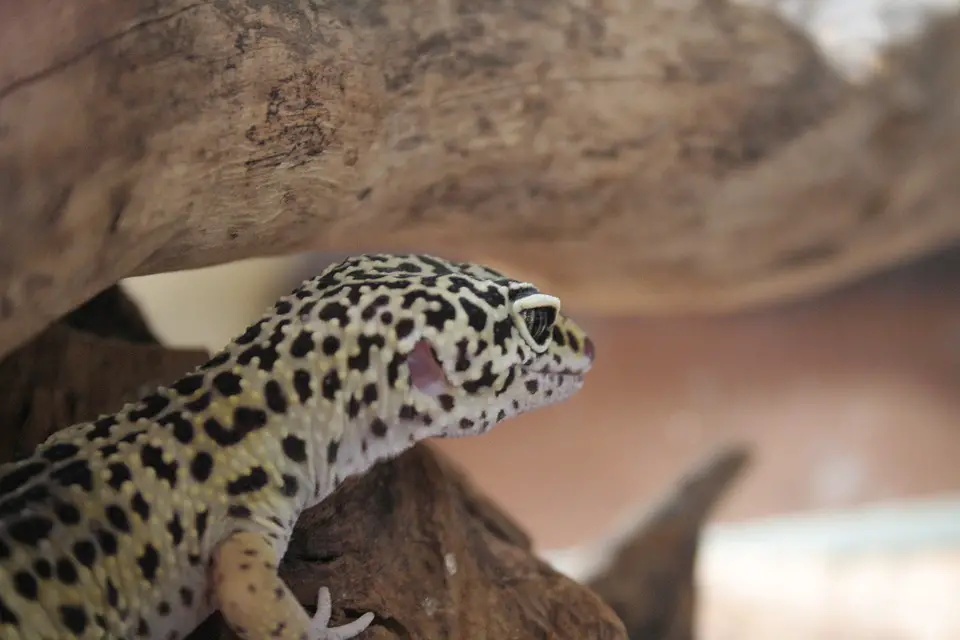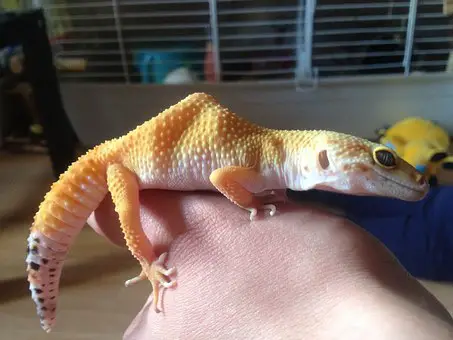Do you know how to tell if your Leopard Gecko is stressed or happy? Well, it is difficult to notice when a gecko is unwell. However, it is easier to recognize a problem when you have a standard behavioral checklist to compare against. For example, if you’re a beginner and trying to get a leopard gecko from a breeder, ask and research the pet’s normal behaviors. This way, you’ll learn to recognize signs of stress.
Stress can be divided into physical, emotional, and mental stresses. Physical stress occurs when the body cannot deal with stressors. On the other hand, Emotional stress is perceived when one experiences negative emotions such as anxiety and depression. Mental stress occurs when the brain is stressed and unable to function normally.
In this article, we’ll be going over some of the more obvious signs that your gecko may be suffering from stress.

One of the most common things you will see in a leopard gecko’s behavior is either stressed or over-stimulated. They may be hiding, or they may be very aggressive or nervous. The most common question I get from readers is how they get to know when a leopard gecko is stressed.
Here is my 5-step process to help you tell if your leopard gecko is stressed.
- Identify the Criteria to classify ‘stressy’ behavior
- Measure the Data
- Compare It to the Normal
- Determine if you are handling a Stress situation
- Make an appropriate corrective decision
In this article
How To Tell If A Leopard Gecko Is Stressed.
I don’t know about you, but I love leopard geckos! They are so charming and lovable, and they seem to be one of the easiest reptiles to keep. They’re great pets for people with little reptile experience because they require very little attention. They eat a lot of insects, and they like to bask in the sun.
There are many signs your leopard gecko might display when stressed. Understanding your leopard gecko’s behavior is crucial if you want to have a healthy, happy pet.
Leopard Gecko Stress Signs include;
- Tail Wagging
- Being abnormally Aggressive when being Handled
- Hiding often for more extended periods than usual
- Vocalizations
- Are they unresponsive to touch?
- Changes in feeding behavior
- Glass Surfing
- Are your pets overly licking or scratching themselves?
- Having Irregular Bowel Movements
- Digging
- Does your pet exhibit tremors, cramps, or convulsions?
If your pet is exhibiting any of these behaviors, it may be suffering from stress, and you should seek help from a veterinarian immediately.
How can I help my stressed leopard gecko?
Treat your leopard gecko as you would a human being. You should always be aware of your gecko’s health and well-being. If you notice anything that looks unusual, take note of it so you can act appropriately.
Leopard geckos require warm temperatures, right humidity, and a diet of live insects. If you’re not able to provide these, your gecko will probably be stressed out.
If you’ve got a gecko that’s sick, injured, or even just stressed out from the move to a new home, it could be causing problems for your pet. The good news is that many issues are easily fixable.
Acknowledge how pet care is different from human care.
When you look after pets, you have to deal with the fact that they won’t make sound decisions and judgments like humans.
- You’ll have to make decisions based on your judgment.
- You’ll have to keep them entertained.
- You’ll have to think about where they can and can’t go.
- And you’ll have to make sure they stay safe from harm.
If you do this, then you’ll be able to learn how to provide a safe environment for your pets so that they can live out the rest of their lives happily and healthily.
Prioritize preventive to reactive health care for your leopard gecko.
No matter what type of care, it’s always essential to get your pet checked by a vet if there is any concern. Preventive care is vital for maintaining a healthy pet. It can help reduce your pet’s chance of getting sick or injured. Reactive care is necessary when an illness or injury occurs. It can help to minimize further damage to your pet.
Perform a wellness check on your gecko.
You’ve got to learn how to do a wellness check on your gecko. When checking on your gecko, you may find that you don’t know if your gecko is healthy or not, especially if you are a beginner keeper.
As you check on your gecko, you must ask yourself if you’re using the suitable methods to assess the health of your gecko. You may find that you’re using unreliable methods to check on your gecko. Then you can make an adjustment and find more reliable ways to assess your gecko’s health.
If you do this, then you’ll be able to find out the true health of your gecko. You’ll be able to tell when something is wrong with your gecko. And you’ll know what to do about it. This will help you take control of your gecko’s health.
What could you do if you had to rescue an injured or ill Leopard Gecko?
I agree that the title doesn’t quite reflect the content of the question, but I think it’s okay. This is one of my favorite questions; as an animal lover (not a vet), it has helped me think about what I would do if I had to rescue an injured or ill animal.
I also like that the answers don’t have to be directly related to the animal.
The best way to rescue an injured animal is to have a plan in advance. If you’ve got that figured out, it’s probably going to be much easier.
It would be best to learn how to perform CPR on an animal. It’s not something you’ll necessarily use every day, but you should know how to do it. You might also want to learn some basic first aid for animals.
This can be useful for emergencies but not always relevant. You can find yourself in an emergency situation and be unable to provide CPR or first aid for humans or animals. In that case, you can call 911 or a local vet or animal shelter and let them handle it.


